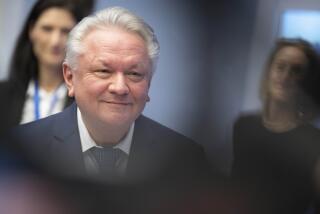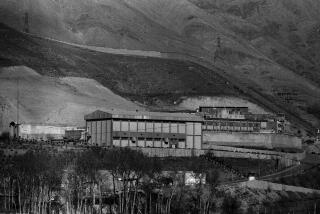U.S. Confronts Bonn on Poison Gas Aid to Iran
- Share via
WASHINGTON — After months of quiet investigation, the Bush Administration has uncovered information that a private West German company has been arranging the sale of a significant quantity of chemicals that are suspected of being used to improve Iran’s chemical warfare capabilities.
The German government’s earlier resistance to subtle pressure led Secretary of State James A. Baker III to use strong language in his discussions here last week with West German Foreign Minister Hans-Dietrich Genscher, which was followed by a formal letter to the Bonn government over the weekend urging it to prevent the private sale of chemicals to Tehran.
U.S. officials have suspected that private German companies have been arranging sporadic sales of what are known as “precursors,” the basic components that when mixed together make a variety of chemical weapons.
Bush Administration sources said that, even if delivered, however, the chemicals would not be sufficient for Iran to equal the poison gas capability of neighboring Iraq, which made widespread use of chemical weapons during the eight-year Persian Gulf War.
“The Iranians are simply not that far along,” a U.S. official said. “But getting access to precursors is one of the necessary steps in improving capability. This is enough to make a difference.” Bush Administration sources added that the Iranians have been working secretly to purchase precursors for several months.
U.S. officials said they suspect that the key middleman in the alleged deal is Kharim Ali Sobhani, an Iranian envoy and businessman who they say was indicted previously in the United States for export violations involving chemicals and high technology.
In light of the recent controversy over sales of chemical precursors by private West German companies to Libya, U.S. sources expressed “deep regret” that Bonn had not sufficiently tightened restrictions on the sale of precursors to prevent their sale, particularly to Middle East countries that are currently in an arms race to improve their chemical capability.
“The Germans generally are receptive to our requests, but frankly they are slow to respond,” the source said.
This source said that various U.S. channels have been used to relay specific information on the Iranian middleman and the German company, which was not identified. Because the Germans were slow to respond, the Administration decided to put more pressure on Bonn last week.
The confrontation between Washington and Bonn comes after recent accusations by U.S. counterterrorism officials that West Germany on several counts has bungled the investigation into the bombing over Scotland last December of Pan Am Flight 103, which originated in Frankfurt. It also follows the earlier controversy over a West German company’s reported sale of precursors for a chemical warfare plant in Libya.
The United States became convinced in the middle of last year that the Libyans were developing an advanced chemical warfare plant in Rabta, a remote desert complex. As in this lastest case, the United States repeatedly pressured West Germany and then leaked stories through the press about the sale by private German companies of precursors to the regime of Col. Moammar Kadafi.
That pressure led to a German investigation and pledges of greater security on the export of potential chemical warfare precursors. But the potential sale by German companies to Iran has heightened concern within the Bush Administration that Bonn is not following through as promised.
A Bush Administration official said he believes that the Germans had moved slowly in reacting to the latest allegations of a chemical sale in part because of embarrassment over the earlier incidents, and in part because Bonn legally cannot prevent the sale of all precursors that are widely used--particularly in Third World countries--as pesticides and in industrial use.
Difficult to Prove
U.S. officials concede that it is often difficult to prove the intent of chemical precursor purchases.
In many countries, including the United States, the sale of many precursors used in the manufacture of chemical weapons is not illegal. And current international conventions do not prohibit the manufacture of chemical weapons. The 1925 Geneva Protocol, signed by the United States, West Germany, Iran and dozens of others, only restricts the use of chemical weapons.
“It is difficult for us and for them to come up with sufficient evidence, to gather and collect data proving that the sale of these commodities are tied to military usage,” a State Department source said.
At the summit of seven industrial nations that convenes in Paris July 14, the United States is expected to push for greater allied cooperation on preventing the proliferation of chemical warfare capabilities.
More to Read
Sign up for Essential California
The most important California stories and recommendations in your inbox every morning.
You may occasionally receive promotional content from the Los Angeles Times.













